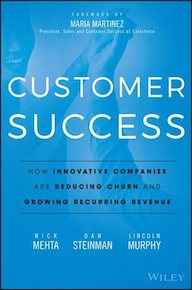
Published on October 06, 2019
I’m currently reading the book ‘Customer Success’ where authors Nick Mehta, Dan Steinman and Lincoln Murphy have excellently squeezed down customer success secrets by deriving 10 crisp laws for customer success. Maria Martinez, President of Salesforce sales and customer success has played magnificent role in lifting this book up by sharing sales force strategies, examples, efforts and success mantras.
‘You cannot be the same, think same and act same if you hope to be successful in a world that does not remain the same!’
Someday somewhere on internet I read this sentence and I find it very important in customer success philosophy.
Customer Support is a traditional term we are hearing since childhood and Customer Success is a buzzword since quite a few years now! Though everyone knows language difference of these two terminologies; companies often mix-up both or end up forgetting the difference in routine challenges. And if this happens, it directly hits on company’s growth model!
In my views, these are obvious differences between these two terms:
- Customer support is reactive, whereas customer success is pro-active.
- Customer support has defined process, whereas customer success process varies based on customers.
- Customer support roles are well defined, whereas customer success roles demand multi-skills.
- Customer support fits easily in ROI model. Whereas customer success has periodically raised questions on financial investments. Maria Martinez has simplified it very well in this book: ‘When done right, customer success needs little justification!’
- Customer support is about winning one-time transaction. Whereas customer success is about investing in long term values and investing in their business model.
- Customer support is about engaging with customer on need basis. Whereas customer success is about always engaging with customers at emotional and rational level.
- Customer support comes after sales. Sales excellence is of course very important to win a customer, but customer success is about keeping the customers happy after sales!
- Customer support goal is to solve customer problems or give them smooth operational experience. Whereas customer success is all about reducing customer turnover and make customers happier!
- Customer support team will have customer support engineers. Whereas customer success team should have data analyst along with customer success officer. Analyst’s job is to dig and derive important customer data and act on to it, reach out to customer BEFORE the problem occurs!
- Customer support do not demand exceptional compensation. But customer success should have shares to each customer success team member, so everyone has equal share in the game!
Teams are very much and almost always into hard times of solving customer problems that they don’t look beyond to think about customer success! The approach to be pro-active and not reactive gets buried somewhere in handling escalations!
In the race of acquiring new customers, customers retention is also very critical! Companies does a lot to win a customer, but does very little to collect data of those customers that will help them to identify their problems, their growth and success models, give them insights to identify their gaps and then provide them ways to solve these gaps and moreover, come up with a growth and success model for them!
My personal opinion is that treat your every customer as you would want yourself to be treated! Listen to customers, feel their problems and help them to succeed! It’s also about succeeding together and your customers will also appreciate this!
In this book, authors have offered these 10 laws that help you building customer success model at organization level and personal level:
Law 1. Sell to the right customer! Selling to wrong customer will create disasters!
Law 2. Natural tendency of customers and vendors is to drift apart! Charge your customer success team to prevent this happening. Don’t let the customer go out of the radar. If so, check the bridge in your customer success team and manage / replace him / her!
Law 3. Customers expects you to make them widely successful! Care less about success of your solutions. Rather care how your solutions can help them succeed! Share your experiences with other customers that can help them.
Law 4. Reluctantly monitor and manage customer health. Healthy customers will take you seriously, use your products / services, will share regular feedbacks, provide healthy ratings and also help you to succeed together with them. Manage customer health matrix.
Law 5. You can no longer build loyalty from personal relationships. With large small and big customer base you may not able to connect personally with all of them very often. Create a framework for this. Be in touch in different ways, generate feedback sharing model. Develop tech-touch methods like e-mails, webinars, communities, user groups and events!
Law 6. Product is your only scalable differentiator. It should be easy to use. Customer success representative should collect feedback about how to make it more friendly for their customers. Arrange some sessions where your development team and client can directly communicate and make them understand about customers’ needs. (Working in service industry, I consider this very true for solutions we are offering to our customers.)
Law 7. Obsessively improve time to value. Implementation time, product maturity time, training time, customer adoption time – all these count before customer satisfaction and it is important to be less, so you don’t miss the train!
Law 8. Deeply understand your customer matrix. Collect and analyze matrix of variety of your customers. How is each customer’s satisfaction rate related to size of organization, type of users, frequency of usage, type of services used and build upon that internally and with clients.
Law 9. Drive customers success through hard matrix. Consistent measurements help achieving repeatability, consistency, standardization, proficiency, retention and happiness
Law 10. Top down company-wide commitment. No matter whatever practice you establish, the concept will not be a successful execution until you are able to build customer success as your company core value and embrace in your culture!
It will be too much to write but I highly recommend you study customer success models of companies like Salesforce, Apple, Netflix, Workday, Virgin Atlantic and few others. They are all different based on their service offering, size, customer base but they have successfully customized their customer success business models and they can be our very potential mentors in this area!









